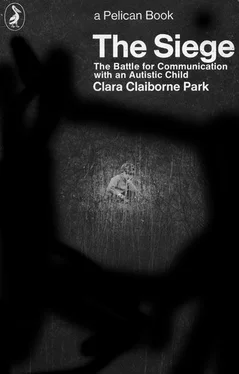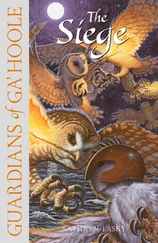But it was not yet time for heartbreak. Elly’s doctor and the consulting paediatrician had told us to wait six months before we began to worry. I remember another sentence: ‘I don’t think you got a lemon.’ We heard it with gladness; in such a case one does not quarrel with phrasing. We waited and watched. Elly learned to walk shortly after she came home from the hospital, as we could have predicted. She learned new words (it was the day after she came home that she said ‘scissors’). But we began to see that she forgot the old ones, and as the months passed she paid no more attention than before to what we said to her. If she had come out of the hospital still within the curve of normal development she did not long remain there. We watched, with ever sharper and more experienced eyes. As the months passed and Elly fell farther and farther behind we did not seek other opinions. We were determined from the start we would not repeat the lacerating pilgrimage of other parents of the retarded and abnormal, the disrupting and expensive treks from specialist to specialist, city to city, trying to buy hope.
Speechless, uncomprehending, unable to care for her physical needs, Elly was retarded in every functional way. If occasional actions suggested intelligence, common sense told us that it must be so with all retarded children. All parents would be tempted to magnify these pathetic flickers into the illusion of significance.
That year of waiting was not passive. That was the year we began the continual series of minor assaults on Elly’s fortress, the siege that is the subject of this book. But it was a year of waiting nevertheless. Intuitively we felt it was too soon to press for certainty about this child’s condition. It was better, we thought, to wait — better for Elly and for us all. Better, quieter, more dignified, more normal, to carry on the life of the family as usual than to take these ambiguous symptoms to other doctors and bring home other ambiguous opinions. More dignified-and also more intelligent. My husband is a physicist, and in our house the disciplines of science are deeply felt. We guessed that doctors, insofar as they are not magic men but scientists, work as other scientists do, by inferences drawn from evidence. There was little evidence here. Two doctors had found it insufficient. We would wait until we could accumulate more.
We waited out those six months, and six months after that. Then, reluctantly, we prepared for a second attempt at a diagnosis. Elly was not quite three.
We did not mean to shop around and we did not have to. We were lucky enough to have a close friend, himself a doctor and professor, with many connections in the research hospitals of both Boston and New York. His little boy, just Elly’s age, was severely retarded both mentally and physically, though with none of Elly’s mysterious remoteness. Our friend had already been through it all. His own search had made him wise. He knew what we needed: a doctor who was abreast of the most recent developments in mental and physical illness but who was above all an intelligent and warm human being. He even knew who he was. Dr Blank was a nationally known paediatrician, a professor of paediatrics, an eminent man. There should be no temptation to appeal his decision.
We drove to Boston with Elly and stayed the night with friends. In the morning we got Elly ready to see the doctor. I dressed her up in navy-blue dotted swiss with a red sash. Pretty clothes meant nothing to Elly, but she looked charming when we took her in and that meant something to us. I do not know if it is obvious that the first visit to a doctor to consult about a mentally abnormal child is a very tense experience. This doctor was the friend of a friend; not many parents are so lucky. Yet still we were uneasy. Would it be possible to talk to this man? Would he want to listen to what we could tell him? Would he respect us that much? We imagined ourselves in his position, examining the healthy, attractive, gravely defective child of two people he did not know. He was an eminent and experienced man but he could analyse only what he saw, and in this hour before us — in any given hour — what could he see of Elly? What was there to be seen? It was highly unlikely she would exhibit one of her rare signs of intelligence right there in his office, or even speak one of her five words. More probably she would sit like a lump, as she had sat in the doctor’s office a year before, and then such conclusions as he could draw would rest only on that meaningless silence and on what we could tell him. And why should he believe that?
But our luck held. Our friend had chosen well for us; we profited from his own false starts and blind alleys. Dr Blank was a rare person, not merely knowledgeable in his profession but gifted in his understanding of people. He made it easy for us to tell him what we had learned about making contact with Elly, and using it he made of the routine physical examination an opportunity of reaching Elly as few could reach her. We suggested that he tickle her and he did. He jigged her up and down. He wasted no time with words. He had a way with children and he used it. Within ten minutes he had seen her smile and laugh — a common enough sight to us but one no doctor had ever seen before.
We relaxed. It was possible to act naturally with this kind, bright man who seemed to trust us. I began one of our games with Elly. I had brought a bag of candy to occupy her when she got restless. I took a piece out and popped it into her mouth. She did not ignore me. She did not take another for herself. Instead, she reached her own hand into the bag and fed one to me. Not a high degree of interpersonal activity for an hour-long session between three adults and a three-year-old child, but we were satisfied. Dr Blank had seen Elly at her best, such as it was. What he told us we would trust.
We had asked him at the outset: ‘What is the very worst possibility we might have to face?’ We are ready, expecting it: to be told that, like so many parents of retarded children, we have been kidding ourselves, that there is no mystery about our Elly, that her strange abilities are no more than the creations of our desperate imaginations, that she is simply a retarded child, so severely retarded that, almost three years old, she still has no comprehension of human speech.
I had no doubt of what the worst possibility would be. Off and on, over the years, I had come across a few retarded children and heard stories of others. No family is exempt — my own uncle, injured before birth when my grandmother’s carriage- horses went out of control, had never learned to walk or talk. Uncle Will had died at twenty-one, still an incontinent baby, a generation before I was born. My grandmother, a strong- minded woman, had done what was very unusual at the time — after keeping him at home for years, she had put him into an institution. To spare the family, I suppose, but I think also to spare herself. She couldn’t bear it. I had a horror of retardation.
I assumed I could rise to most challenges if my children presented them, but I had wondered about that one. Myself proud of intellect, in my husband, in my children, in myself, I had thought that retardation was the worst thing that could happen to a baby, to a family, and to me.
But apparently this was not the worst possibility. There was another. The worst diagnosis he could give us would be a different word altogether — autism. Dr Blank had seen other children like Elly. At Johns Hopkins, in Baltimore, the psychiatrist Leo Kanner had for twenty years been studying a strange category of children, children who were like and yet not like the psychotic, neurotic, brain-damaged, and retarded children with whom he was familiar. It was hard to say what they were. They had Elly’s blank remoteness, her inability to relate to others. They had her imperviousness to speech; several of them had previously been diagnosed as deaf. They, like her, did not talk or, if they did, reeled off long formulas without communicative significance — television commercials, nursery rhymes, even lists of presidents. They had the same dexterity, the same interest in exact and delicate arrangement. They had the same unusual physical health, the same alert, attractive good looks. They even had the same intellectual parents: my husband and I, while scarcely typical of the population as a whole, were typical of the parents of autistic children.
Читать дальше












